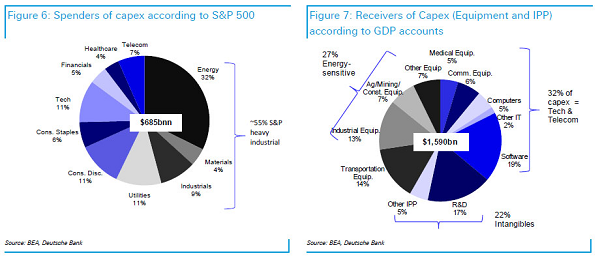Let's just admit it: We don't have a true free-market economy.
If we did, the market would set the price of money, with the supply and demand for credit setting interest rates rather than a handful of unelected bureaucrats at the Federal Reserve. If we did, politicians wouldn't dole out tax credits, subsidized loans, and generous government contracts to preferred industries and companies.
And if we did, we wouldn't have bailed Wall Street out of the mess it created during the housing bubble with nary a slap on the wrist — with some estimates putting the price tag at nearly $8 trillion — as their CEOs spent millions on bonuses and office redecorations in the midst of the downturn.
All of this meddling is justified, so we're told, in pursuit of that elusive state of economic nirvana: Full employment and low inflation.
Related: Why the Next Recession Will Be Different
I'm not here to pass judgment on whether this has been a success, just to acknowledge that if we're honest, and want to spread the largesse evenly in the interests of the bigger picture, then the oil and gas folks could use a helping hand. Last week, crude oil plunged below $58 a barrel for the first time since May 2009. Wholesale gasoline futures have dropped by nearly one-half from their summertime highs. And further declines look likely.
All of this is threatening what has been the lone bright spot of the economic recovery to date: The growth of the U.S. energy industry thanks to the rise of fracking technology and the opening of production in shale plays.
Related: Why America’s Energy Renaissance Has a Long Life
A major portion of job gains since late 2007 have been concentrated in shale-oriented states such as North Dakota and Texas. The increase in domestic oil and natural gas production has helped narrow the U.S. trade deficit by about a third since 2006. Debt issuance to fund investment in the exploration and production of new shale wells has increased the overall U.S. bond market's allocation to the energy sector. And, as I discussed in a recent column, the collapse of energy prices has been the primary cause of the recent turbulence in financial markets.
As things stand now, energy prices are poised for additional weakness.
OPEC officials just confirmed that they're in no hurry to cut production — with no emergency meeting planned until the first quarter of 2015. On the demand side, we need to see a rebound in Asia and Europe. But both of these things are outside our control.
How bad could it get? Morgan Stanley warned its clients that Brent crude, which is now joust above $61 a barrel, could fall as low as $43 in the first quarter of 2015. On Sunday, United Arab Emirate Energy Minister Suhail Al-Mazrouei said OPEC would stick to its guns "even if oil prices fall as low as $40 a barrel" and would wait at least three months before considering an emergency meeting.
Related: How Gas Prices Could Affect the Value of Your Home
Unless oil gets back up to $80 a barrel soon, which is where Barclays Capital believes the U.S. shale oil industry's breakeven price is, the energy sector will be in trouble, with knock on effects for the rest of the economy.

Sure, cheap oil is great for consumers, with Credit Suisse estimating that the average family will enjoy an extra $1,000 on an annualized basis from the drop in gas prices. But calculating the contagion effects from a collapse in the U.S. shale industry — from debt defaults, to layoffs, to a cut in investment spending (of which energy is responsible for about a third of overall spending) — suggests we could collectively end up worse off.
In fact, Deutsche Bank's David Bianco recently warned clients that as things stand now, the oil price collapse could result in a rare profit recession for the economy — something that hasn't been seen since 1998 and has been associated, historically, with an average stock market decline of nearly 17 percent. The 1998 pullback totaled more than 22 percent. To put that in perspective, a similar decline now would take the S&P 500 back to levels not seen since the summer of 2013. Profit recessions were also seen in 1967 and 1985-1986.
Related: Why Santa Claus Turned His Back on the Stock Market
The hallmark of these pullbacks is commodity price weakness that, in turn, weighs on the pricing power of materials, energy, and industrial stocks. In 1998, oil prices dropped around 30 percent. In the 1980s, they dropped about 40 percent. The 1967 pullback was a doozy, with stocks losing 23 percent for their worst non-recession fall except for 1987.
The downward spiral has already started. Companies like BP (NYSE: BP) and ConocoPhilips (NYSE: COP) have recently announced layoffs. The high-yield corporate bond market has been slammed back to levels not seen since last November on expectations of increased defaults and restructuring by over-indebted and unprofitable energy companies. And the U.S. oil rig count, as reported by Baker Hughes (NYSE: BHI) is dropping at its fastest rate in two years.
Related: More Than $150 Billion of Oil Projects Face the Axe in 2015
So maybe it’s time to start thinking about another bailout. Outside of the economic justification for assistance to the energy industry — perhaps in the form of a federal tax holiday — there are also the foreign policy implications of the oil sheiks' cold-blooded attempt to bolster OPEC's market share at the expense of domestic U.S. producers. The government already provides billions in annual tax breaks to big oil, but continuing America's path to energy independence is worth something; it reduces our exposure to risks such as transit bottlenecks (such as Iran's presence in the Strait of Hormuz), vulnerable regimes (such as the West's intervention in Libya in 2011), and a repeat of OPEC's oil price shocks of the 1970s.
I know this is all pie-in-the-sky stuff given political realities and the impossible task of explaining to voters why cheaper gas could be a bad thing. But I wonder if by indulging in the short-term satisfaction of cheaper fill-ups we're inviting long-term pain down the road.
Top Reads from The Fiscal Times:





